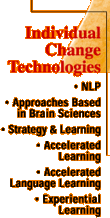 |
|||||
 |
|||||
 |
|||||
 |
 |
||||
Learning a new language is very much an adventure. It is an adventure in learning about other people and other cultures. It is an adventure in filling in the gaps in ones knowledge, through learning new concepts and new ways of viewing the world. It is an adventure in finding new ways to enrich how one expresses oneself. And it is an adventure in learning about oneself.
At Chris Lonsdale and Associates we make use of accelerated learning methodologies (link to Accelerated learning page) to teach Mandarin Chinese (link to Mandarin course page). The term accelerated learning is actually a generic word encompassing various disciplines and bodies of knowledge including suggestopoedia, psychological memory research, and performance enhancement technologies such as Neuro-linguistic programming.
The Brain and Learning
What does all that mean? It's quite simple, really. The human brain and memory system has a number of important functioning characteristics:
1. Pattern Recognition
The brain is actually a highly sophisticated pattern recognition device. Our natural state is one of being in an environment that consistently bombards us with information through all of our senses. Our brain recognises patterns that occur within that mass of information. Patterns that are recognised are then remembered for later use.
2. Repetition and Context
In recognising patterns the brain will pay particular attention to events that occur frequently. When the repetition occurs in changing contexts the brain very easily establishes rules and puts those into long term memory.
3. Single Presentation Recall
Even without repetition, the brain is able to store massive amounts of information in long term memory after just one presentation. Recall for a moment some event that you remember very well from the past. It could be an event from many years ago. For instance, I remember around age 11 starting someone's bulldozer by accident and then not being able to turn it off.
What special event do you remember? What do you actually remember about that event? Can you still see the environment in which the event happened? The people? The colours? Do you recall the feelings you had? What about things people said (if there were people present)? More importantly ...and this is the crux.... notice that the event occurred only once, but you still remember it.
We often use the expression "it stands out in my memory" for a very good reason. The event does stand out in your memory. A fairly mundane comment made by someone in a mundane situation will seldom be well remembered. However, an event that was special will be remembered easily. Special in this case means that the environment was different in some way (so that it caught your attention), or it had special meaning, or possibly there was strong emotion involved. And, if all of these conditions were in place, that memory will be even more easily accessible.
Quite simply, the more of us that is involved in a situation, the more easily we are able to recall that situation and its details at some later time. So, to really remember things well we need to have as many tags associated with them as possible. We need to use colour. Emotion. Sound. Music. Our bodies. And we need to continuously create meaning.
Sounds Good....
The effectiveness of accelerated learning has been demonstrated widely in empirical research that has been done around the world. A few examples here will give a flavour of the research.
1. Beginning Russian was taught at Cleveland State University in 1971. One group was a control group, taught conventionally. The other (experimental) group was taught using some Accelerative Learning Techniques. The experimental group was able to learn 20 weeks worth of work in 10 weeks, a doubling of the speed of learning.
2. In 1976 Bordon and Schuster compared Spanish taught with Accelerative Learning Techniques and Spanish taught conventionally. An acceleration rate of 2.5 times was observed in the accelerated group.
3. In 1984 Shority conducted beginning German to several army groups at Fort Devans using Accelerative Learning Techniques. The results were compared with several previous German courses held at Fort Devans using an audio-lingual drill approach. The regular course took 360 hours, versus the pilot course which lasted 108 hours and 18 days. Of students taking the regular programme, only 26% achieved level 1 mastery of oral German while 73% of the Accelerated programme students achieved level 1 mastery or better. So, they had better performance for less than one third of the class time.
4. Some of the most outstanding results have been achieved by Georgi Lozanov, the Bulgarian psychologist who can be said in many ways to be the father of Accelerated Learning. In an experimental French course that was rigorously controlled by the relevant ministries in Bulgaria, 60 students who remained in the course were able to learn an average of 80 new words ever day besides grammar, spelling and pronunciation. In some sessions up to 150 new words were learned, and in two extraordinary sessions 500 new words were given and learned. This was all achieved in three hours class time per day, with no opportunity for homework.
5. At Chris Lonsdale and Associates we have been running courses in Mandarin Chinese (Putonghua) using Accelerated Learning methodology with very pleasing results . In just 56 hours adults have been able to grasp the basics of Mandarin, to the point where they have been able to continue learning the language effectively simply by being in Chinese language environment.
To find out more about Accelerated Learning, visit our Internet Bookstore.